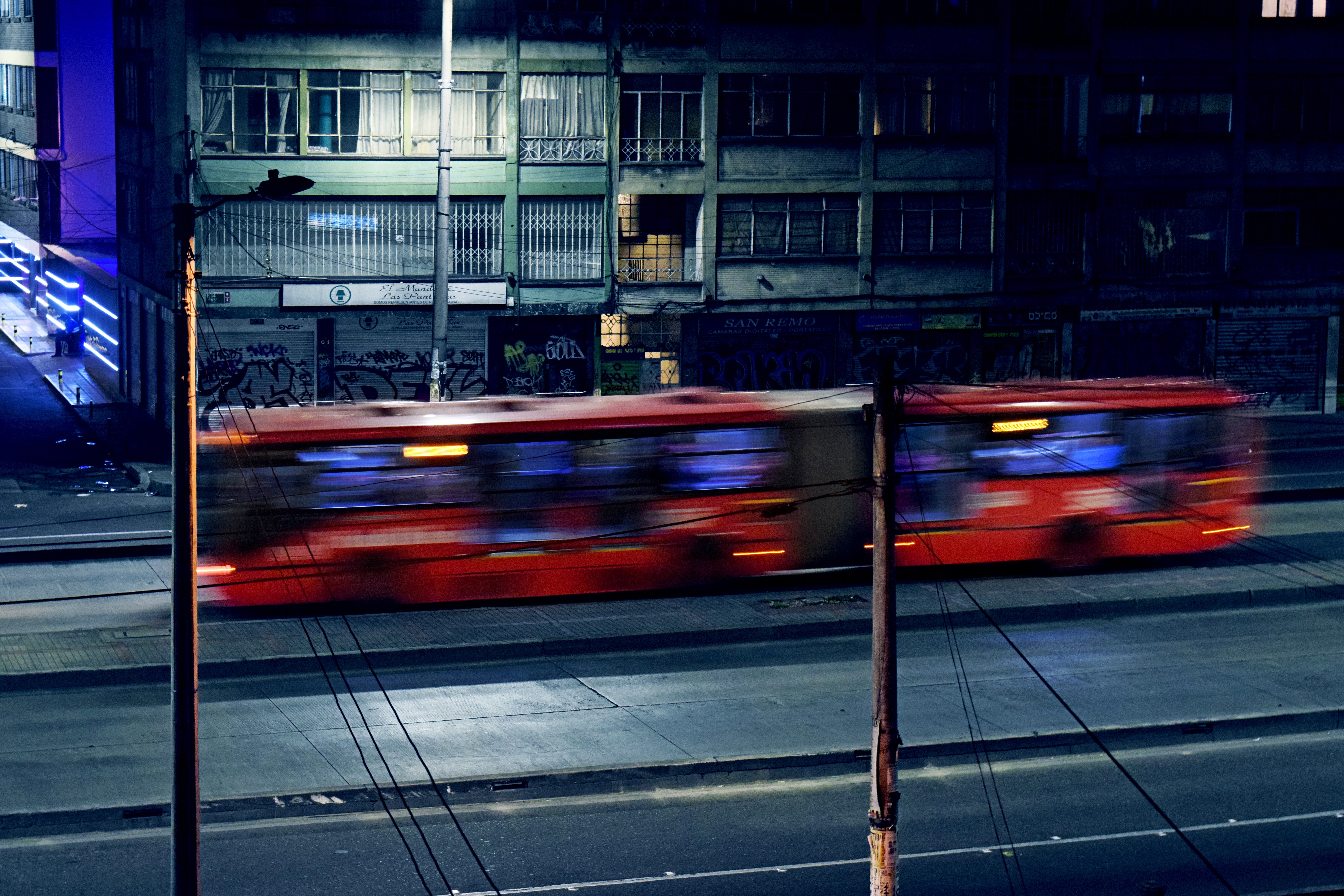Lit Mags
The Loneliness of the Long-Distance Bus Ride
“We Are the Ones on the Bus,” short fiction by Matthew Baker

The Loneliness of the Long-Distance Bus Ride
We Are the Ones on the Bus
We have been on the bus for years. The bus is modern, a double-decker coach with a narrow stairway, and can accommodate exactly one hundred passengers, not including the drivers. Each of us has a seat. Above each seat is a switch for a light and a vent for air, heating or cooling depending on the climate. Beneath each seat is an outlet for chargers and a space for a bag, about the size of an average backpack. The cushions on the seats have vibrant patterns, vaguely reminiscent of the carpeting in movie theaters. The bus is neither comfortable nor uncomfortable. The bus is neither spacious nor cramped. The bus is approximately half full. At the front of the bus is a trash receptacle, where crumpled wrappers and peels and rinds can be thrown away after meals have been eaten. At the back of the bus is a bathroom, which has a mirror where makeup can be applied in the morning and removed in the evening. We sleep in the seats, using bunched towels for pillows, sometimes wadded jackets or sweatpants. People in cars occasionally stare at us before passing us on the highway.
None of us were born on the bus. Each of us chose to board, climbing onto the bus at a desolate stop on a foggy turnpike, or a dusty road, or a sunny lane, or a rainy intersection, hurrying down the aisle with a furtive glance at the other passengers. We have been on the bus ever since. Some months ago an elderly passenger with silver stubble and tortoiseshell eyeglasses who was known to have a fondness for salted caramel candies suffered a massive coronary and perished on the stairway, spilling a handful of caramels onto the steps, and was removed from the bus later that night by a pair of paramedics, but other than that none of us have ever died on the bus. Each of us possesses a ticket, with the glorious destination printed in metallic lettering beneath the name of the company. Some of the tickets have fraying edges, worn apart by superstitious rubbing, while other tickets are in mint condition, kept in wallets for protection. In the years that we have been on the bus we have seen all manner of sights out the windows. Skyscrapers gleaming in cities with magnificent boulevards, picturesque towns, quaint villages, craggy snowcapped mountains tinted indigo by the dusk, grassy rolling hills smoldering pink in the dawn, dew glittering on plains, mist drifting across marshes, sunbathers in bikinis lying on sandy beaches, surfers in wetsuits sitting on rocky outcroppings, dark clouds flickering with heat lightning, hail falling onto streets of bobbing umbrellas, snow flurrying through crowds of hooded parkas, uniformed bands marching in spectacular parades, thrill seekers cheering on carnival rides, anglers fishing from docks crusted with barnacles, horseback riders galloping wildly across windswept ranches, gamblers streaming into shimmering casinos, sunlight sparkling across the chrome hulls in sprawling trailer parks, stars twinkling above glassy lakes teeming with rickety cottages, homey farmhouses with children climbing on rusted tractors, weathered bungalows with children swaying in hammocks between the trees, suburban mansions with children bouncing on trampolines in the yards, people standing near grain silos, people walking around water towers, curving skate ramps spattered with vivid graffiti, ancient railroad bridges overgrown with flowering weeds, fireworks, rainbows, and towering billboards. All noise from outside the bus is muffled. The inside of the bus is profoundly quiet. Conversations are held in hushed murmurs. We wear headphones when we want to listen to music. Music never plays over the speakers of the bus. The drivers rarely make announcements, only when the bus is making a pit stop at a gas station or a rest area, and even then only to announce the time that the bus will depart again. With a sense of reverence, even a feeling of anxiety, each of us makes careful note of the time announced.
We hurry off of the bus the second that the doors accordion apart. Each pit stop is exactly one hour. We have that time, and that time only, to shower, to get haircuts, to wash clothing, to buy food and toiletries and medications. Because these are the only occasions on which we are able to interact with the world beyond the windows of the bus, the pit stops are a powerful experience for us, almost transcendental. After years of nearly constant motion, the sense of motionlessness is disorienting, standing there stock-still in a gas station or a rest area, staring at a colorful display of candy bars, or salted nuts, or ice creams, or greasy frankfurters rotating behind glistening glass. The mystical churning of a slushy machine. The cryptic hum of a soda dispenser. Ordinary people chat and laugh with each other in the aisles. As we shop for supplies, we smile at the ordinary people sometimes, longing frantically for some connection. To feel kinship. To feel companionship. Though we try to look friendly, we can feel that the smiles are frightening, radiating pain and desperation.
None of us have to ride the bus. We have no obligation. We could leave the bus whenever we wanted, could join any of those happy communities of stationary people. But if we left the bus, that would mean we would never arrive where the bus is going. The possibility of reaching that destination consumes us. Casting one last glance at the gas station or the rest area, we climb back onto the bus, and we settle into the seats, hearts full of despair and ambition. The engine comes to life with a roar. The bus glides back onto the highway, and we gaze out the windows at the dazzling blur of neon and fluorescence, the headlights and taillights and glowing signs. The bus may never arrive. We know that. But the bus may arrive. We are exhilarated, are utterly enraptured, by the promise of the tickets that we possess. Even managing to find the bus once was a miracle. Some days ago as the bus pulled out of the parking lot of a truck stop at the designated time, a murmur passed through the bus, scattered gasps and exclamations, and all of us turned toward the windows in shock to see a passenger bolting from the doors of the truck stop a minute too late, her hair still damp from a shower, wearing only shorts and a bra and a single flip-flop, running after the bus with her arms outstretched, waving and pleading for the bus to come back, then stumbling over a curb and collapsing onto the pavement, shaking her head and clutching her chest and weeping as she watched the bus vanish into the distance and we watched her become part of the background. That horrible look on her face, realizing she had been left behind, is the thing that we fear most in the world.
About the Author
Matthew Baker is the author of Hybrid Creatures, a collection of stories written in hybrid languages, and the children’s novel If You Find This, which was a Booklist Top Ten Debut of 2015 and an Edgar Award Nominee for 2016. His fiction has appeared in publications such as American Short Fiction, New England Review, One Story, Electric Literature, and Best of the Net. Born in Michigan, he currently lives in New York City, where he teaches at New York University. Visit him online at: www.mwektaehtabr.com
“We Are the Ones on the Bus” is published here by permission of the author, Matthew Baker. Copyright © Matthew Baker 2018. All rights reserved.







